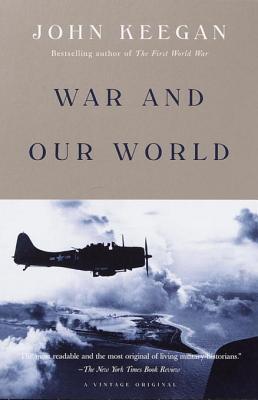
War and Our World
فرمت کتاب
ebook
تاریخ انتشار
2011
نویسنده
Charlotte P. Barnerنویسنده
Charlotte P. Barnerنویسنده
John Keeganشابک
9780307779991
کتاب های مرتبط
- اطلاعات
- نقد و بررسی
- دیدگاه کاربران
نقد و بررسی

April 23, 2001
Keegan, bestselling historian of the First and Second World Wars, synthesizes his views on war and peace in this series of five lectures given in 1998 and now published as a set of essays. Drawing on a lifetime of study and writing, Keegan ranges widely over his subject, delving into the history of war, the character of a professional soldier, the diverse views of anthropologists on the origin of social violence, the advent of high-tech warfare and many other relevant issues. Keegan argues that war takes so many forms and mutates so rapidly that it is impossible to define precisely. The author's best descriptive definition is that war is "collective killing for some collective purpose." Today, Keegan believes, the most catastrophic form of war, the use of nuclear weapons, is unlikely to occur, although he does not address the recent entry of India and Pakistan, among other nations, into the nuclear club. Currently, war occurs most often in multiethnic, underdeveloped areas of the world and is driven by poverty, ideology and cultural insecurity. Keegan puts the death toll in the world's wars over the past 50 years at some 50 million. One practical suggestion he offers is to control the proliferation of assault rifles, whose low price, high rate of fire and nearly universal availability have made large-scale slaughter possible anywhere. War and Our World
is replete with such insights and ideas, lucidly expressed by a master in his field. (June 1)Forecast:Michael Howard's equally succinct
The Invention of Peace (Forecasts, Feb. 26) deals with a similar subject, but Keegan's—thanks to his reputation, in particular, the huge success of
The First World War (Vintage, 2000), which sold more than 222,000 copies to become a
New York Times bestseller
—will outsell it by far.

May 15, 2001
Popular military historian Keegan presents his 1998 Reith lectures for the BBC in a book that should only enlarge his readership. The twentieth century's wars seem to have affected every person on the planet because, until the current trend toward smaller, volunteer militaries, building huge armies by massive conscription meant that every man was potentially a soldier. Further, it seems that everyone has questioned whether war is intrinsic to human nature and whether it can be brought to an end. Keegan responds to those issues from a perspective steeped in world military history. He declares that it can't be decided whether war is a product of genetically ingrained human aggressiveness or is socially constructed. He is optimistic, however, that the waging of war will become more codified and that certain practices and weapons will be outlawed. Still, he gives peaceniks a cold bath, for he regards the project to eliminate war through progressive legal constriction as delusion. An astute discussion, mixing idealism and realism about its subject.(Reprinted with permission of Booklist, copyright 2001, American Library Association.)

























دیدگاه کاربران